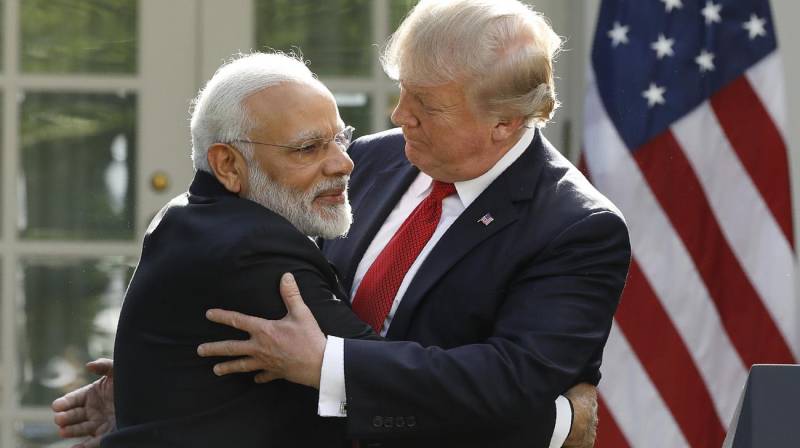
India has decided to charge higher duties from Sunday on imports of 28 US products – including almonds, apples and walnuts – in response to the US government's decision this month to withdraw certain trade privileges for the South Asian country.
From June 5, US President Donald Trump scrapped trade privileges under the Generalized System of Preferences (GSP) for India, the biggest beneficiary of a scheme that allowed duty-free exports of up to $5.6 billion, DW reported.
India termed the move "unfortunate" and vowed to uphold its national interests.
New Delhi's retaliation now will likely hurt US exporters of agricultural goods. India is by far the largest buyer of US almonds, paying $543 million for more than half of US almond exports in 2018, the US Department of Agriculture data shows. It is the second-largest buyer of US apples, taking $156 million worth in 2018.
The move is expected to heighten trade tensions between the two countries. It comes ahead of Prime Minister Narendra Modi's meeting with Trump on the sidelines of a G20 summit in Japan on June 28 and 29.
US Secretary of State Mike Pompeo, who is expected to visit India this month, said this week the US was open to dialogue to resolve trade differences with India through greater access for American companies to its markets.
Trade between India and the US has grown rapidly over the past decade and stood at about $142.1 billion in 2018. The two countries enjoy close bilateral ties, but Washington has long accused India of being a "high-tariff country" that limits access to its huge market.
US trade officials also accuse New Delhi of deploying "a wide array of trade barriers that create serious negative effects on US commerce." This, they argue, has led to the US facing a huge trade deficit with India, amounting to some $27.3 billion in 2017.
Furthermore, New Delhi's new rules in areas such as e-commerce and data localization have angered Washington and hit companies including Amazon, Walmart, Mastercard and Visa.
Previously, the Trump administration imposed tariffs of 25 per cent on steel and 10 per cent on aluminum imported from India. Angered by Washington's refusal to exempt it from the higher steel and aluminium tariffs, India initially issued an order in June last year to raise import taxes as high as 120 per cent on a slew of US items.
But New Delhi repeatedly delayed raising tariffs as the two nations engaged in trade talks.
From June 5, US President Donald Trump scrapped trade privileges under the Generalized System of Preferences (GSP) for India, the biggest beneficiary of a scheme that allowed duty-free exports of up to $5.6 billion, DW reported.
India termed the move "unfortunate" and vowed to uphold its national interests.
New Delhi's retaliation now will likely hurt US exporters of agricultural goods. India is by far the largest buyer of US almonds, paying $543 million for more than half of US almond exports in 2018, the US Department of Agriculture data shows. It is the second-largest buyer of US apples, taking $156 million worth in 2018.
The move is expected to heighten trade tensions between the two countries. It comes ahead of Prime Minister Narendra Modi's meeting with Trump on the sidelines of a G20 summit in Japan on June 28 and 29.
US Secretary of State Mike Pompeo, who is expected to visit India this month, said this week the US was open to dialogue to resolve trade differences with India through greater access for American companies to its markets.
Trade between India and the US has grown rapidly over the past decade and stood at about $142.1 billion in 2018. The two countries enjoy close bilateral ties, but Washington has long accused India of being a "high-tariff country" that limits access to its huge market.
US trade officials also accuse New Delhi of deploying "a wide array of trade barriers that create serious negative effects on US commerce." This, they argue, has led to the US facing a huge trade deficit with India, amounting to some $27.3 billion in 2017.
Furthermore, New Delhi's new rules in areas such as e-commerce and data localization have angered Washington and hit companies including Amazon, Walmart, Mastercard and Visa.
Previously, the Trump administration imposed tariffs of 25 per cent on steel and 10 per cent on aluminum imported from India. Angered by Washington's refusal to exempt it from the higher steel and aluminium tariffs, India initially issued an order in June last year to raise import taxes as high as 120 per cent on a slew of US items.
But New Delhi repeatedly delayed raising tariffs as the two nations engaged in trade talks.
